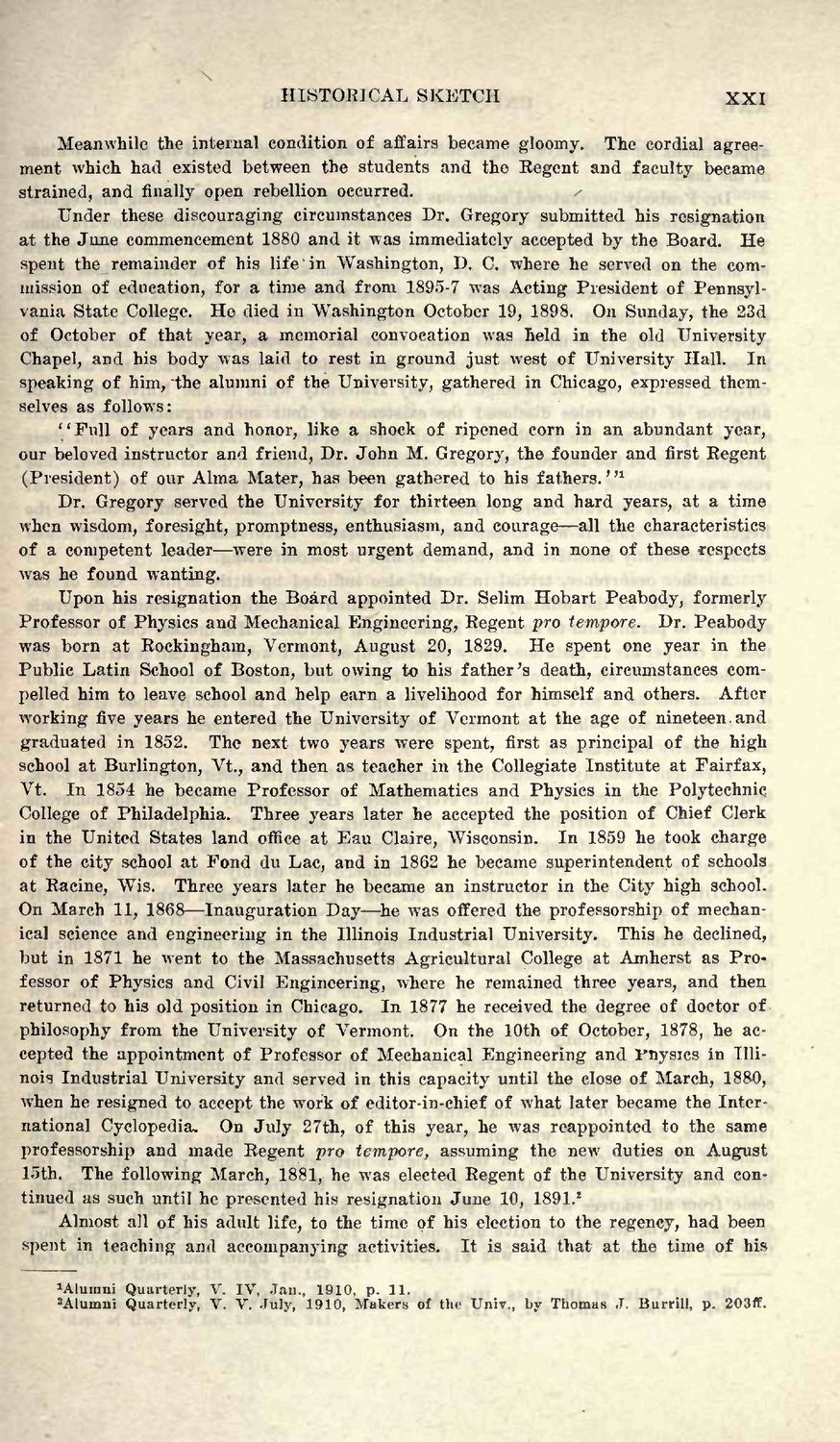| |
| |
Caption: Book - Early History of University (1916)
This is a reduced-resolution page image for fast online browsing.

EXTRACTED TEXT FROM PAGE:
\ HISTORICAL SKETCH XXI Meanwhile the internal condition of affairs became gloomy. The cordial agreement which had existed between the students and the Regent and faculty became strained, and finally open rebellion occurred. /Under these discouraging circumstances Dr. Gregory submitted his resignation at the June commencement 1880 and it was immediately accepted by the Board. He spent the remainder of his life'in Washington, D. C. where he served on the commission of education, for a time and from 1895-7 was Acting President of Pennsylvania State College. Ho died in Washington October 19, 1898. On Sunday, the 23d. of October of that year, a memorial convocation was held in the old University Chapel, and his body was laid to rest in ground just west of University Hall. In speaking of him, the alumni of the University, gathered in Chicago, expressed themselves as follows: " F u l l of years and honor, like a shock of ripened corn in an abundant year, our beloved instructor and friend, Dr. John M. Gregory, the founder and first Regent (President) of our Alma Mater, has been gathered to his f a t h e r s . ' " Dr. Gregory served the University for thirteen long and hard years, at a time when wisdom, foresight, promptness, enthusiasm, and courage—all the characteristics of a competent leader—were in most urgent demand, and in none of these respects was he found wanting. Upon his resignation the Board appointed Dr. Selim Hobart Peabody, formerly Professor of Physics and Mechanical Engineering, Regent pro tempore. Dr. Peabody was born at Rockingham, Vermont, August 20, 1829. He spent one year in the Public Latin School of Boston, but owing to his father's death, circumstances compelled him to leave school and help earn a livelihood for himself and others. After working five years he entered the University of Vermont at the age of nineteen.and graduated in 1852. The next two years were spent, first as principal of the high school at Burlington, Vt., and then as teacher in the Collegiate Institute at Fairfax, Vt. I n 1854 he became Professor of Mathematics and Physics in the Polytechnic College of Philadelphia. Three years later he accepted the position of Chief Clerk in the United States land office at Eau Claire, Wisconsin. In 1859 he took charge of the city school at Fond du Lac, and in 1862 he became superintendent of schools at Racine, Wis. Three years later he became an instructor in the City high school. On March 11, 1868—Inauguration Day—he was offered the professorship of mechanical science and engineering in the Illinois Industrial University. This he declined, but in 1871 he went to the Massachusetts Agricultural College at Amherst as Professor of Physics and Civil Engineering, where he remained three years, and then returned to his old position in Chicago. I n 1877 he received the degree of doctor of philosophy from the University of Vermont. On the 10th of October, 1878, he accepted the appointment of Professor of Mechanical Engineering and Vnysics in Illinois Industrial University and served in this capacity until the close of March, 1880, when he resigned to accept the work of editor-in-chief of what later became the International Cyclopedia, On July 27th, of this year, he was reappointed to the same professorship and made Regent pro tempore, assuming the new duties on August 15th. The following March, 1881, he was elected Regent of the University and continued as such until he presented his resignation June 10, 1891.* Almost all of his adult life, to the time of his election to the regency, had been spent in teaching and accompanying activities. I t is said that at the time of his Alumni Quarterly, V. IV, Jan., 1910, p. 11. ! Alumni Quarterly, V. V. July, 1910, Makers of the Univ., by Thomas ,T. Burrill, p. 203ft.
| |